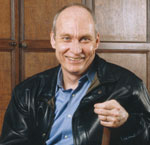Commentary: Michael Turner
"A new generation of physicists has at last taken on the challenge of creating a complete theory—one capable of explaining, in Einstein's words, 'every element of the physical reality.' And judging from the progress they have made, the next [21st] century could usher in an intellectual revolution even more exciting than the one Einstein helped launch in the early 1900s."
J. Madeleine Nash, Time magazine, January 3, 2000
 Photo: The University of Chicago |
Outgrowing Einstein
2005 has been designated the World Year of Physics. Around the world scientists and the public alike are beginning to celebrate the 100th anniversary of Einstein's annus mirabilis, the year in which he wrote five papers that forever changed physics. Five years ago, Time magazine jumped the gun by naming Albert Einstein Person of the Century. And all of this for good reason: these papers laid the foundations for two towering intellectual achievements of 20th century physics—quantum theory and relativity theory. These two theories not only revolutionized physics, but led to sea changes in many other aspects of life. Nobel Laureate Leon Lederman has boldly stated that quantum mechanics accounts for one-third of our GDP, and it's hard to argue with him. Just imagine turning off quantum mechanics for a few minutes. Quantum mechanics and relativity have also changed the way we think about reality: God does play dice; time is relative; and space is flexible.It has taken nearly a century to get our heads fully around all the implications of quantum mechanics and relativity. Quantum theory has progressed from the photoelectric effect and wave mechanics to quantum field theory and the Standard Model of particle physics. The Standard Model explains essentially all of the phenomena of the world around us, and has opened the door to discussing the earliest moments of creation and how the universe began. And of course, myriad inventions based upon quantum mechanics have changed the way we live.
Today, all but one of the basic predictions of Einstein's theory of general relativity have been tested. That lone holdout—the direct detection of gravitational waves—is not likely to last much longer, as LIGO, Geo, Virgo and other gravity-wave detectors hit their stride. Theorists have taken almost a whole century to fully plumb the mathematical depths of general relativity. Today, Einstein's theory provides the basis for understanding the origin and evolution of the universe and the black holes that power quasars—and is critical, as well, to the accurate functioning of the Global Positioning System.
Now, one hundred years after the annus mirabilis, physicists have outgrown Einstein and are ready to move beyond. This is normal; in science, no theory lives forever. Though in that regard, Einstein's general relativity ranks second only to Newton's theory of gravity in longevity. The success of a theory lies not only in how much it explains, but in how it prepares us to further deepen our understanding of nature. On both accounts we have much reason to celebrate the annus mirabilis. Quantum theory and relativity have allowed us to understand the universe from quarks to the cosmos. They have also allowed us to ask—and have readied us to answer—some of the biggest questions ever tackled: What are space and time? Did the universe have a beginning? What is our cosmic destiny?
Today, I believe that we are truly on the edge of discovery and on the verge of the next revolution in our understanding of the universe. We can only imagine the surprises that lie ahead and their broader impact for all of society. Two things are certain, however: particle physicists, using both accelerators and telescopes, will be at the forefront in this grand adventure, and the news from the front lines will be reported right here in symmetry.
Michael S. Turner heads the National Science Foundation's Directorate for Mathematical and Physical Sciences, which provides $1 billion a year to support fundamental research. He is also the Rauner Distinguished Service Professor at The University of Chicago. Turner's research on early universe cosmology helped to bring the fields of cosmology and particle physics together, and he chaired the National Research Council Committee that produced the influential report, Connecting Quarks with the Cosmos.
Click here to download the pdf version of this article.


